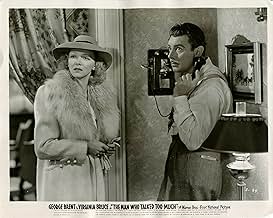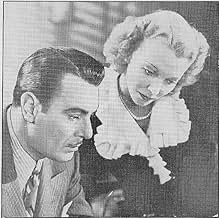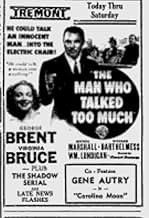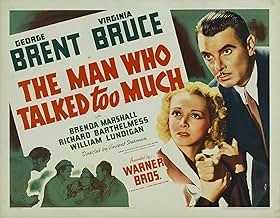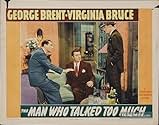Añade un argumento en tu idiomaA DA quits after wrongly convicting an innocent man. His secretary joins his new law firm, which prospers through mob ties. His brother John joins but discovers corruption and helps the feds... Leer todoA DA quits after wrongly convicting an innocent man. His secretary joins his new law firm, which prospers through mob ties. His brother John joins but discovers corruption and helps the feds, leading to his own false murder conviction.A DA quits after wrongly convicting an innocent man. His secretary joins his new law firm, which prospers through mob ties. His brother John joins but discovers corruption and helps the feds, leading to his own false murder conviction.
- Dirección
- Guión
- Reparto principal
Edwin Stanley
- District Attorney Nelson
- (as Ed Stanley)
Kay Sutton
- Mrs. Knight
- (escenas eliminadas)
Reseñas destacadas
The Man Who Talked Too Much presumably refers to George Brent, who plays a district attorney who sends an innocent man to the death house. To compensate for his mistake he becomes a struggling defense lawyer, eventually taking on some nasty gangland types in order to make ends meet. The film starts in terrific fashion and is well acted and written throughout, but it eventually bogs down into a standard 'B' plot of frame-ups and revenge. Nevertheless I recommend this to anyone interested in second features, and it certainly has the grit one expects of Warner crime films. Watch for Marc Lawrence in one of his patented bad guy roles.
This opens with lawyer George Brent probing a man guilty in court. The guy is sent to prison and is readied for the electric chair. New evidence comes to light: He is innocent. There are frantic attempts to reach the warden. But they;re unsuccessful. An innocent man has been killed as we watch the flicker of the chair.
This all happens in the first few minutes. It's giving nothing away. The rest of the movie involves Brent's deciding to make some money and starting to defend shady characters. His loyal secretary Virginia Bruce goes with him. (What a beauty she was! Such a haunting look.) His brother William Lundigan has graduated from law school. Etc. Brenda Marshall has too small a role. It hops the track but in some ways is an early noir.
This all happens in the first few minutes. It's giving nothing away. The rest of the movie involves Brent's deciding to make some money and starting to defend shady characters. His loyal secretary Virginia Bruce goes with him. (What a beauty she was! Such a haunting look.) His brother William Lundigan has graduated from law school. Etc. Brenda Marshall has too small a role. It hops the track but in some ways is an early noir.
The Man Who Talked Too Much is the second of three versions that Warner Brothers did of the same film. I've not seen The Mouthpiecewhich was the prototype, but the film Illegal which starred Edward G. Robinson that came out in 1955 was far superior to this one. Possibly audiences were more sophisticated then and wouldn't buy what was being sold in this film.
George Brent plays our protagonist and he's a hard driving Assistant District Attorney who mistakenly convicts an innocent man and the real culprit does not confess until it is too late. Feeling a lot of remorse he leaves the DA's office and goes into private practice with faithful secretary Virginia Bruce. But he's not getting any good paying clients until he gets off Henry Armetta for assaulting one of Richard Barthelmess's hoods. Impressed with his work Barthelmess puts Brent on permanent retainer.
With that a change comes over Brent that his idealistic younger brother William Lundigan doesn't like. After that Lundigan who is a newly minted attorney himself does something that in real life would get him disbarred.
What it is I won't reveal, but instead of disbarment he gets framed for murder and it's up to Brent to save him by whatever means necessary.
What Lundigan does in fact is what turned me off to this film which is a sincere effort by the cast and director. Lundigan's legal dilemma as shown in the film has been dealt with before on the big screen and small. In fact Tom Cruise in The Firm had the same situation and he handled much better than Lundigan.
Check Robinson's film also it's far better done.
George Brent plays our protagonist and he's a hard driving Assistant District Attorney who mistakenly convicts an innocent man and the real culprit does not confess until it is too late. Feeling a lot of remorse he leaves the DA's office and goes into private practice with faithful secretary Virginia Bruce. But he's not getting any good paying clients until he gets off Henry Armetta for assaulting one of Richard Barthelmess's hoods. Impressed with his work Barthelmess puts Brent on permanent retainer.
With that a change comes over Brent that his idealistic younger brother William Lundigan doesn't like. After that Lundigan who is a newly minted attorney himself does something that in real life would get him disbarred.
What it is I won't reveal, but instead of disbarment he gets framed for murder and it's up to Brent to save him by whatever means necessary.
What Lundigan does in fact is what turned me off to this film which is a sincere effort by the cast and director. Lundigan's legal dilemma as shown in the film has been dealt with before on the big screen and small. In fact Tom Cruise in The Firm had the same situation and he handled much better than Lundigan.
Check Robinson's film also it's far better done.
I nearly always prefer watching the original film and not remakes. Yet somehow, I have managed to watch both remakes ("The Man Who Talked Too Much" and "Illegal") without yet seeing the first film ("The Mouthpiece")--so I can't really compare the remakes with the original. But, in nearly every case, I do prefer original films and I must knock a point off "The Man Who Talked Too Much" for being a remake.
Of the three leads from these three films, George Brent in "The Man Who Talked Too Much" is probably the most poorly cast. While a fine actor, it is harder to imagine him playing a rather crooked individual--whereas Warren William and Edward G. Robinson are a bit more at home with such roles. Also, I will admit it up front that the plot is really hard to believe. So, to enjoy the film you just have to accept that Brent could be bad and the rest of the plot. If you can't, the film just won't work very well.
The film begins with Brent playing a prosecuting attorney, Stephen Forbes. He convicts a man for murder and is quite pleased with himself--until they learn he was innocent. To make things worse (and HIGHLY contrived), they find out only seconds before the execution and they cannot reach the warden in time to stop it! Forbes is horrified and quits his job--which isn't too surprising. Now in private practice, he has a hard time making ends meet. But, when mobsters find out how talented he is, he immediately becomes a success--to the horror of his younger and very idealistic brother. What follows is amazingly contrived (you just have to see it) but also enjoyable in a brainless sort of way. Not a bad film--but one that could have been better.
UPDATE: I finally got to see the original version, "The Mouthpiece". It's significantly better...and a lot racier!
Of the three leads from these three films, George Brent in "The Man Who Talked Too Much" is probably the most poorly cast. While a fine actor, it is harder to imagine him playing a rather crooked individual--whereas Warren William and Edward G. Robinson are a bit more at home with such roles. Also, I will admit it up front that the plot is really hard to believe. So, to enjoy the film you just have to accept that Brent could be bad and the rest of the plot. If you can't, the film just won't work very well.
The film begins with Brent playing a prosecuting attorney, Stephen Forbes. He convicts a man for murder and is quite pleased with himself--until they learn he was innocent. To make things worse (and HIGHLY contrived), they find out only seconds before the execution and they cannot reach the warden in time to stop it! Forbes is horrified and quits his job--which isn't too surprising. Now in private practice, he has a hard time making ends meet. But, when mobsters find out how talented he is, he immediately becomes a success--to the horror of his younger and very idealistic brother. What follows is amazingly contrived (you just have to see it) but also enjoyable in a brainless sort of way. Not a bad film--but one that could have been better.
UPDATE: I finally got to see the original version, "The Mouthpiece". It's significantly better...and a lot racier!
Brilliant ADA Stephen M. Forbes (George Brent) gets an innocent man executed. In frustration, he quits to work for the innocent. Only it doesn't pay well. That when gangster Roscoe recruits Steve to be a mob lawyer. He uses the money to put his younger brother Johnny through law school.
I saw the punch coming a mile away and the KO really bugged me. I can take a bit of artistic license, but I can't take that. The stunts are too outrageous. This is based on a play and is the second adaptation. While I can accept the premise as written, it feels constructed. Mostly, I don't like Steve turning into a mob lawyer that quick. Maybe he could defend Roscoe first without agreeing to defend all his friends. This deals with a real lawyer issue, but does it in a rather ham-fisted way. This is borderline fine.
I saw the punch coming a mile away and the KO really bugged me. I can take a bit of artistic license, but I can't take that. The stunts are too outrageous. This is based on a play and is the second adaptation. While I can accept the premise as written, it feels constructed. Mostly, I don't like Steve turning into a mob lawyer that quick. Maybe he could defend Roscoe first without agreeing to defend all his friends. This deals with a real lawyer issue, but does it in a rather ham-fisted way. This is borderline fine.
¿Sabías que...?
- CuriosidadesFrank J. Collins based his protagonist on Manhattan defense attorney William Joseph Fallon, dubbed "The Great Mouthpiece" by the 1920's New York press, who had a short but spectacularly successful career before succumbing to the effects of his own dissoluteness at the age of 41.
He has been cited as one of the inspirations for the celebrity lawyer Billy Flynn in the popular musical Chicago. He is also portrayed for six episodes by David Aaron Baker in the HBO television series Boardwalk Empire (2010).
- ConexionesReferences 20.000 años en Sing Sing (1932)
Selecciones populares
Inicia sesión para calificar y añadir a tu lista para recibir recomendaciones personalizadas
Detalles
- Duración1 hora 16 minutos
- Color
- Relación de aspecto
- 1.37 : 1
Contribuir a esta página
Sugerir un cambio o añadir el contenido que falta

Principal laguna de datos
By what name was The Man Who Talked Too Much (1940) officially released in India in English?
Responde


